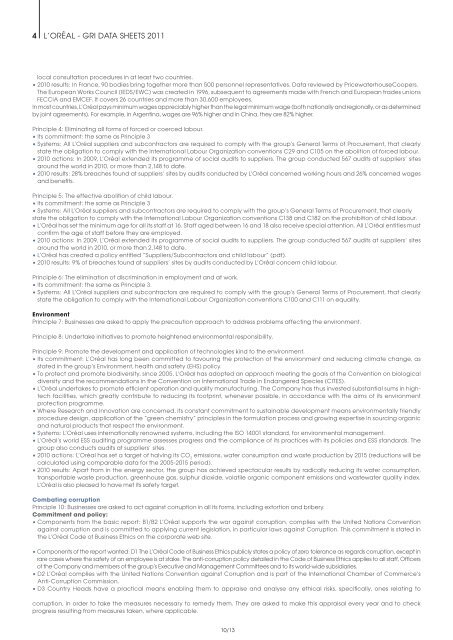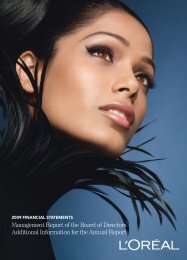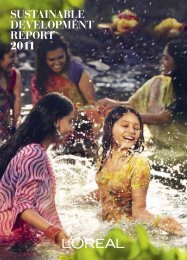Organizational Strategy - Sustainable Development - L'Oréal
Organizational Strategy - Sustainable Development - L'Oréal
Organizational Strategy - Sustainable Development - L'Oréal
You also want an ePaper? Increase the reach of your titles
YUMPU automatically turns print PDFs into web optimized ePapers that Google loves.
4 L’OréaL - GrI DaTa SHEETS 2011<br />
local consultation procedures in at least two countries.<br />
• 2010 results: In France, 90 bodies bring together more than 500 personnel representatives. Data reviewed by PricewaterhouseCoopers.<br />
The European Works Council (IEDS/EWC) was created in 1996, subsequent to agreements made with French and European trades unions<br />
FECCIa and EMCEF. It covers 26 countries and more than 30,600 employees.<br />
In most countries, L’Oréal pays minimum wages appreciably higher than the legal minimum wage (both nationally and regionally, or as determined<br />
by joint agreements). For example, in argentina, wages are 96% higher and in China, they are 82% higher.<br />
Principle 4: Eliminating all forms of forced or coerced labour.<br />
• Its commitment: the same as Principle 3<br />
• Systems: all L’Oréal suppliers and subcontractors are required to comply with the group’s General Terms of Procurement, that clearly<br />
state the obligation to comply with the International Labour Organization conventions C29 and C105 on the abolition of forced labour.<br />
• 2010 actions: In 2009, L’Oréal extended its programme of social audits to suppliers. The group conducted 567 audits at suppliers’ sites<br />
around the world in 2010, or more than 2,148 to date.<br />
• 2010 results: 28% breaches found at suppliers’ sites by audits conducted by L’Oréal concerned working hours and 26% concerned wages<br />
and benefits.<br />
Principle 5: The effective abolition of child labour.<br />
• Its commitment: the same as Principle 3<br />
• Systems: all L’Oréal suppliers and subcontractors are required to comply with the group’s General Terms of Procurement, that clearly<br />
state the obligation to comply with the International Labour Organization conventions C138 and C182 on the prohibition of child labour.<br />
• L’Oréal has set the minimum age for all its staff at 16. Staff aged between 16 and 18 also receive special attention. all L’Oréal entities must<br />
confirm the age of staff before they are employed.<br />
• 2010 actions: In 2009, L’Oréal extended its programme of social audits to suppliers. The group conducted 567 audits at suppliers’ sites<br />
around the world in 2010, or more than 2,148 to date.<br />
• L’Oréal has created a policy entitled “Suppliers/Subcontractors and child labour” (pdf).<br />
• 2010 results: 9% of breaches found at suppliers’ sites by audits conducted by L’Oréal concern child labour.<br />
Principle 6: The elimination of discrimination in employment and at work.<br />
• Its commitment: the same as Principle 3.<br />
• Systems: all L’Oréal suppliers and subcontractors are required to comply with the group’s General Terms of Procurement, that clearly<br />
state the obligation to comply with the International Labour Organization conventions C100 and C111 on equality.<br />
Environment<br />
Principle 7: Businesses are asked to apply the precaution approach to address problems affecting the environment.<br />
Principle 8: Undertake initiatives to promote heightened environmental responsibility.<br />
Principle 9: Promote the development and application of technologies kind to the environment.<br />
• Its commitment: L’Oréal has long been committed to favouring the protection of the environment and reducing climate change, as<br />
stated in the group’s Environment, health and safety (EHS) policy.<br />
• To protect and promote biodiversity, since 2005, L’Oréal has adopted an approach meeting the goals of the Convention on biological<br />
diversity and the recommendations in the Convention on International Trade in Endangered Species (CITES).<br />
• L’Oréal undertakes to promote efficient operation and quality manufacturing. The Company has thus invested substantial sums in hightech<br />
facilities, which greatly contribute to reducing its footprint, whenever possible, in accordance with the aims of its environment<br />
protection programme.<br />
• Where research and Innovation are concerned, its constant commitment to sustainable development means environmentally friendly<br />
procedure design, application of the “green chemistry” principles in the formulation process and growing expertise in sourcing organic<br />
and natural products that respect the environment.<br />
• Systems: L’Oréal uses internationally renowned systems, including the ISO 14001 standard, for environmental management.<br />
• L’Oréal’s world ESS auditing programme assesses progress and the compliance of its practices with its policies and ESS standards. The<br />
group also conducts audits at suppliers’ sites.<br />
• 2010 actions: L’Oréal has set a target of halving its CO 2 emissions, water consumption and waste production by 2015 (reductions will be<br />
calculated using comparable data for the 2005-2015 period).<br />
• 2010 results: apart from in the energy sector, the group has achieved spectacular results by radically reducing its water consumption,<br />
transportable waste production, greenhouse gas, sulphur dioxide, volatile organic component emissions and wastewater quality index.<br />
L’Oréal is also pleased to have met its safety target.<br />
Combating corruption<br />
Principle 10: Businesses are asked to act against corruption in all its forms, including extortion and bribery.<br />
Commitment and policy:<br />
• Components from the basic report: B1/B2 L’Oréal supports the war against corruption, complies with the United Nations Convention<br />
against corruption and is committed to applying current legislation, in particular laws against Corruption. This commitment is stated in<br />
the L’Oréal Code of Business Ethics on the corporate web site.<br />
• Components of the report wanted: D1 The L’Oréal Code of Business Ethics publicly states a policy of zero tolerance as regards corruption, except in<br />
rare cases where the safety of an employee is at stake. The anti-corruption policy detailed in the Code of Business Ethics applies to all staff, Officers<br />
of the Company and members of the group’s Executive and Management Committees and to its world-wide subsidiaries.<br />
• D2 L’Oréal complies with the United Nations Convention against Corruption and is part of the International Chamber of Commerce’s<br />
anti-Corruption Commission.<br />
• D3 Country Heads have a practical means enabling them to appraise and analyse any ethical risks, specifically, ones relating to<br />
corruption, in order to take the measures necessary to remedy them. They are asked to make this appraisal every year and to check<br />
progress resulting from measures taken, where applicable.<br />
10/13






